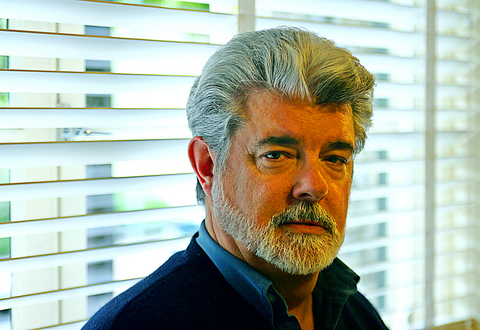Here is a question fit for Yoda: Now that the director George Lucas has finished the last of his six Star Wars movies, what will become of his company, the entertainment empire Lucasfilm?
To hear Lucas tell it, Lucasfilm will be less ambitious, not more. There will be no more live-action blockbuster movies, he said, and that means fewer peaks and troughs: In the past, the company's profits would soar during years when a Star Wars film was released, only to fall off a cliff between movies.
From now on, he said, Lucasfilm will be a "widget-driven" enterprise, churning out books, video games and television shows, with a more predictable rate of return of 10 percent to 20 percent a year. Eventually, he said, the hit-driven cult of personality surrounding both him and Star Wars will give way to "a sane reality."

PHOTO: AP
"I have no intention of running a film company," said Lucas. "That is the last thing in the world I'd do."
"I'm trying to get back to that place that the company functions without me and Star Wars," the multibillionaire added.
Those who know him wonder how much control he is ready to give up. Lucas, 61, started the company in 1971 in Marin County, north of San Francisco, as a production vehicle for his movies, but he has since compiled a dizzying array of entertainment businesses that would make any Hollywood studio chief jealous. They include video games (LucasArts), special effects (Industrial Light and Magic), sound editing (Skywalker Sound) and Star Wars product licensing (Lucas Licensing)

PHOTO: REUTERS
As the sole owner of Lucasfilm, a company that analysts estimate has nearly US$1 billion in annual revenue and virtually no debt, Lucas has no one to answer to -- and he can manage the transition from Star Wars as he sees fit.
"Over the next several months, he said, he plans to concentrate on revving up future projects, including two recently announced Star Wars television series.
"Above all, George wants options," said Jim Morris, a 17-year Lucasfilm veteran who oversaw its special effects and sound divisions before he joined Pixar Animation Studios as a producer. "And those options include, of course, taking the company public one day."
This summer, Lucasfilm's roughly 1,500 employees will move into the Letterman Digital Arts Center, the company's newly built headquarters in San Francisco. Lucas spared no expense in designing the US$350 million campus, where employees will be together in one facility for the first time, far from the mystique of Skywalker Ranch and Lucas. The new place may aid the evolution to a less Lucas-dependent environment.
Micheline Chau, the president and chief operating officer, said Lucas began thinking about overhauling the company in 2002, just after the release of Attack of the Clones, the fifth Star Wars film made.
In a sense, Lucasfilm has always served two masters: Lucas and everyone else. While major decisions are not made without consulting the director, Chau and others have much leeway.
"We are not a democracy," she said. "Still, we've never been, `What would George think?' We've never run our businesses like that. We have to stand on our own two feet."
But as much authority as is afforded to Chau, Lucas remains the arbiter of all things Star Wars. And that is unlikely to change.
"You know we're unusual in the sense that we're bounded by this visionary legend who has created things that have stretched the boundaries of this world's culture," said Howard Roffman, president of Lucas Licensing.
It is precisely that sentiment, though, that may limit Lucasfilm. Critics warn that the company is so tied up in the Star Wars mythology that it will be difficult for Lucas to distance himself.
In fact, Chau said the company had hired a handful of writers and directors to work with Lucas and she hoped they could do projects on their own once they gained the director's trust.
"What is important for management," Chau said, "is that we put people in front of George who can interact with him, work well with him and who are not afraid of George."
But Lucas has made it clear that he is not interested in training a ready army of filmmakers.
"It's not like we have to come up with a movie every year," he said, concerned about what has become a hit-driven business. "I don't want to be Pixar."
His ambition for Lucasfilm, he said, is far more ordinary.
"I'm not depending on these people or a new group of people to take the company into a megahit reality," he said. "I'm trying to build a company where we don't make miracles but we do a good job."

May 26 to June 1 When the Qing Dynasty first took control over many parts of Taiwan in 1684, it roughly continued the Kingdom of Tungning’s administrative borders (see below), setting up one prefecture and three counties. The actual area of control covered today’s Chiayi, Tainan and Kaohsiung. The administrative center was in Taiwan Prefecture, in today’s Tainan. But as Han settlement expanded and due to rebellions and other international incidents, the administrative units became more complex. By the time Taiwan became a province of the Qing in 1887, there were three prefectures, eleven counties, three subprefectures and one directly-administered prefecture, with

Taiwan Power Co (Taipower, 台電) and the New Taipei City Government in May last year agreed to allow the activation of a spent fuel storage facility for the Jinshan Nuclear Power Plant in Shihmen District (石門). The deal ended eleven years of legal wrangling. According to the Taipower announcement, the city government engaged in repeated delays, failing to approve water and soil conservation plans. Taipower said at the time that plans for another dry storage facility for the Guosheng Nuclear Power Plant in New Taipei City’s Wanli District (萬里) remained stuck in legal limbo. Later that year an agreement was reached

What does the Taiwan People’s Party (TPP) in the Huang Kuo-chang (黃國昌) era stand for? What sets it apart from their allies, the Chinese Nationalist Party (KMT)? With some shifts in tone and emphasis, the KMT’s stances have not changed significantly since the late 2000s and the era of former president Ma Ying-jeou (馬英九). The Democratic Progressive Party’s (DPP) current platform formed in the mid-2010s under the guidance of Tsai Ing-wen (蔡英文), and current President William Lai (賴清德) campaigned on continuity. Though their ideological stances may be a bit stale, they have the advantage of being broadly understood by the voters.

In a high-rise office building in Taipei’s government district, the primary agency for maintaining links to Thailand’s 108 Yunnan villages — which are home to a population of around 200,000 descendants of the Chinese Nationalist Party (KMT) armies stranded in Thailand following the Chinese Civil War — is the Overseas Community Affairs Council (OCAC). Established in China in 1926, the OCAC was born of a mandate to support Chinese education, culture and economic development in far flung Chinese diaspora communities, which, especially in southeast Asia, had underwritten the military insurgencies against the Qing Dynasty that led to the founding of